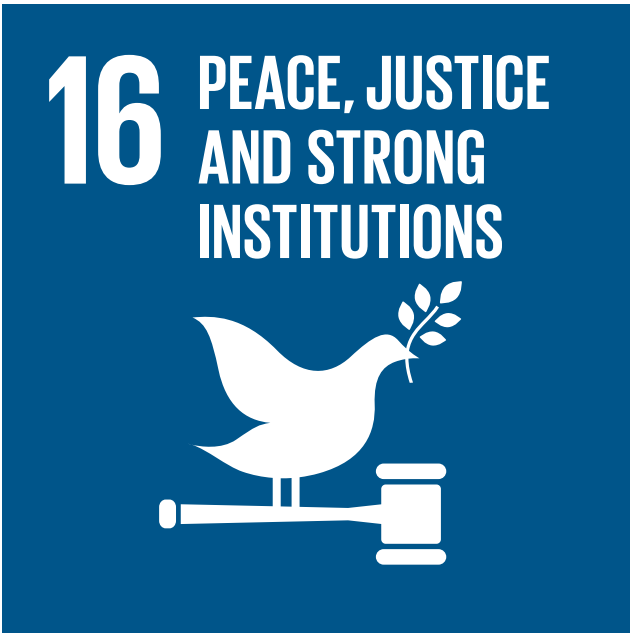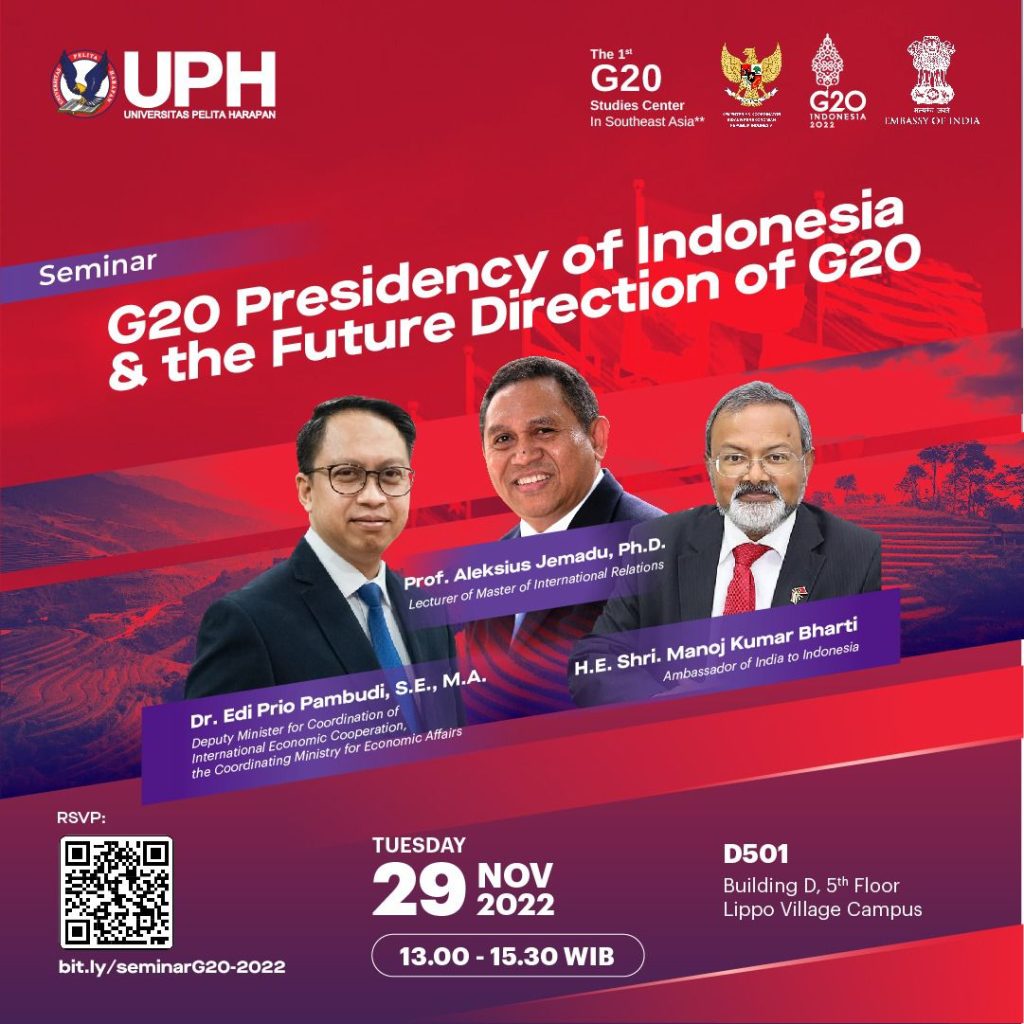
SDG 16: PEACE, JUSTICE AND STRONG INSTITUTIONS
Universitas Pelita Harapan (UPH) is dedicated to SDG 16: Peace, Justice, and Strong Institutions by fostering a culture of integrity, transparency, and good governance. The university promotes ethical practices and accountability within its operations and academic programs. UPH integrates principles of peace and justice into its curriculum, encouraging students to engage in research and projects that address social justice issues and promote civic engagement. The university also supports community initiatives that advocate for human rights and legal reforms. Through these efforts, UPH contributes to building strong institutions and advancing peaceful, just, and inclusive societies.
UPH POLICIES FOR LEGAL AND ETHICAL BEHAVIORS
UNIVERSITY GOVERNANCE MEASURES
ELECTED REPRESENTATION
Universitas Pelita Harapan provides an equal setting for all stakeholders to participate in its governing body. The University Senate is the supreme body in the academic area. This body is elected bi-annually to represent different faculty roles such as professors, the research and community service agency, the registrar office, and the leaders of branch campuses. The last senate membership served in the period of 2022-2024 and the members appointment can be found in this decree.

Senate Session
To represent the interest of staffs, Koperasi Karyawan (KOPKAR) was formed, and all employees are allowed to join as members. KOPKAR serves as a platform to improve employees’ well-being as well as to foster democratic participation in the governance and management of the agency

Kopkar Annual Meeting
STUDENTS’ UNION
The Student Council is the students’ union at Universitas Pelita Harapan that has its election conducted yearly. The nomination and election process is carried out openly with a fit and proper test, oration, and election process. The elect president and vice president for the academic year of 2022/2023 were Aldy M. Fanggidae from the Primary Education study program cohort 2020 and Sianne Tania from the Applied Communication Sciences study program cohort 2020. Students’ union administrators are approved by the Rector through Rector’s Decree No 103/SKR-UPH/VIII/2022. They were inaugurated at the UPH student organization appreciation and inauguration event held annually.

The Student Council took part in conducting the Public Assessment of the candidates of the Task Force for Sexual Violence Prevention and Handling at Universitas Pelita Harapan (Figure 16.4). The task force itself was also comprised of students with the goal to formulate regulations related to the preventive action and handling of sexual violence cases. The appointment decree for the task force members can be found here. The Student Council also provides support for students through trainings of different topics such as leadership, entrepreneurship, mental health, etc. as shown in Figure 16.5. The donation for the Cianjur flood victims and the Blood Donation event are a few examples of BEM supporting students’ social activities as can be seen in Figure 16.6.

BEM’s contribution in UPH’s governance through the Task Force of Sexual Violence Prevention and Handling


BEM’s contribution in UPH’s governance through the Task Force of Sexual Violence Prevention and Handling


BEM conducting social activities
IDENTIFY AND ENGAGE WITH LOCAL STAKEHOLDERS
To identify and engage with local stakeholders external, UPH has a written policy in the form of Rector’s Decree No 032/SKR-UPH/VI/2017. The policy regulates cooperation guidelines containing principles and values of cooperation, provisions of the script, management, identification of categories and criteria of partners, stages of cooperation, exploration, ratification, implementation, monitoring and evaluation, development, to termination of cooperation. The policy applies to domestic and foreign cooperation, academic and non-academic. UPH’s cooperation standards are also regulated in the Cooperation Quality Standards Book Number STA 33/SPMI-UPH.
PARTICIPATORY BODIES FOR STAKEHOLDER ENGAGEMENT
UNIVERSITY PRINCIPLES ON CORRUPTION AND BRIBERY
Universitas Pelita Harapan has established the code of conduct for employees, lecturers, and students. All related parties are subject to the code of conduct and have the responsibilities to maintain good conduct and the reputation of Universitas Pelita Harapan, included but not limited to corruption and bribery. The code of conduct for employees was established through the Rector’s Regulation no. 006/2023, and for students Rector’s Decree no. 003.001/2023.
ACADEMIC FREEDOM POLICY
Universitas Pelita Harapan has established the policy for academic freedom where lecturers are supported to conduct research of their interest and teach or speak in areas of their expertise publicly. The Senate Decree no. 001-SK-Senat-UPH-II-2012 has guaranteed freedom for each lecturer, junior or senior, to disseminate their views and research results in classrooms, defenses, seminars, symposiums, academic publications, conferences, and other forms of scientific meetings. This policy upholds academic freedom by ensuring that discussions and research remain free from external pressure or censorship, allowing for the independent pursuit of knowledge. It aligns with international principles of academic freedom, enabling scholars to engage in open inquiry and the unrestricted dissemination of ideas.
The process of implementing learning, research, and community service is stated in the academic regulations at each level of education, namely:
PUBLISH FINANCIAL DATA
UPH as a private university manages finances independently under the authority of the Finance and Accounting Unit. To ensure transparency, accountability and credibility of finances within UPH, UPH uses a website-based financial system. In addition, the finance unit is also regularly audited by internal auditors under the auspices of a Quality Assurance Unit and audited by a licensed public accountant, Johannes Juara & Rekan. The results of the external audit of UPH’s financial reports are stated in Independent Auditors’ Report 2022.
WORKING WITH GOVERNMENT
PROVIDE EXPERT ADVICE TO GOVERNMENT

Through collaborations of faculties with different levels of government, Universitas Pelita Harapan has been actively engaging with government agencies to provide opinions and expert advice in various areas. At the local level, our Faculty of Law continuously supports the Police Department by assigning expert witnesses in many criminal cases as can be seen in this folder. Regionally, the Faculty of Design has worked with provincial governments in projects to improve residential quality. Nation-wide, our Faculty of Social and Political Sciences has been appointed to establish the G20 Study Center in Indonesia and has since conducted forums on Indonesian G20 Presidency. The Faculty of Law also contributed nationally by assigning our professor to teach future prosecutors with the topic “Principles of law” in the Education and Training Program for Prosecutors organized by the Indonesian Attorney General Office.
POLICY- AND LAWMAKERS OUTREACH AND EDUCATION
The master’s program of International Relations under the Faculty of Social and Political Sciences has conducted a capacity-building program for the employees and the leadership of the District Government of South Minahasa, the province of North Sulawesi. The program aimed to equip the participants with global competence indicators as well as tourism strategy involving digitalization for South Minahasa. By enhancing the capacity of local government officials, this initiative aligns with SDG 16, which promotes peace, justice, and strong institutions. It strengthens local governance, fosters informed decision-making, and contributes to more effective, transparent, and inclusive institutions in the region.
PARTICIPATION IN GOVERNMENT RESEARCH
Universitas Pelita Harapan has been collaborating with government agencies in different programs as well as in research. The Faculty of Design worked with the Office of Public Housing and Residential Areas of DKI Jakarta Province in carrying out the study of land utilization design in the context of securing land assets of flats and their facilities. The collaboration resulted in concepts and strategies for slum upgrading that can be used by the DKI Jakarta government to solve the slum problems. Another research collaboration with the DKI Jakarta government was the knowledge management study in the field of partnership financing and housing asset management in DKI Jakarta province that produced a 10-step action plan for knowledge management to be implemented by the government.

(1) Meeting September 12nd, 2022; (2) Final Meeting – September 29th, 2022
NEUTRAL PLATFORM TO DISCUSS ISSUES
Universitas Pelita Harapan provides a neutral platform through its public lectures and seminars, offering a ‘safe’ space for open discussions on critical issues. Each semester, these events bring together various political stakeholders, including representatives from the Indonesian Advocates Association (Peradi), the Directorate of Social Security and Labor from the Ministry of Manpower, the Directorate of Foreign Labor Control, as well as high-ranking officials such as the Minister of Investment and the Ministry of Defense of Indonesia. These gatherings promote frank discussions on challenges facing the nation, promoting constructive dialogue in a neutral academic environment.
